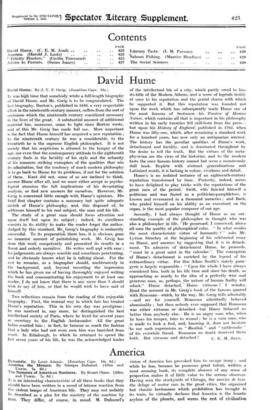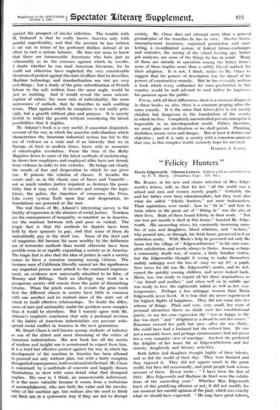America
IT is an interesting characteristic of all these books that they should have been written in a mood of intense reaction from the violent tempo of American life. They may not unfairly be described as a plea for the mastery of the machine by °Ian. They differ, of course, in mood. M. Duhamel's vision of America has provoked him to savage irony ; and while he has, because he possesses great talent, written a most amusing book, its complete absence of any sense of proportion Makes it of _little value to the serious observer. Having seen the stockyards of Chicago, the movies de luxe, the deluge of motor cars in the great cities, the organized but chaotic lawlessness which prohibition has brought in its train, he virtually declares that America is the lunatic asylum of the planets, and warns the rest of civilization
against the prospect of similar_ infection. - The trouble with. M. Duhamil is that he really knows America only with painful superficiality, and that the account he has written is set out in terms - of his profound dislikes instead of an effort to. cast a serials balance. He does not seem to know that there are innumerable Americans who hate just as vehemently as he the excesses against which he revolts. I doubt whether he can read American literature, for he could not otherwise have neglected the very considerable literature df protest against the state of affairs that he describes; Machine technology and Standardization run riot are very evil things ; but a study of the grim subordination of French labour to the soil, written from the same angle, would be just as scathing; And it' would reveal the same miscon- ception of values, the same ruin of individuality, the same narrowness of outlook, that he describes in such scathing terms. That ,against :which he complains is not really prin., ciple,-but a growth without, plan- and purpose. It is merely foolish to indict the growth without considering the latent possibilities that it implies, -
Mr. Adamic's book is a very useful, if somewhat disjointed, account of the way in which the anarchic individualism which characterizes the. American- industrial system has led to the use of violence on a scale and of an intensity that we in Europe, at least in modern times, know only in moments of catastrophic revolution. From the time of the Molly Maguires down to some of the latest methods of racketeering, he shows how employers and employed alike have not shrunk from violence in order to win victories. He brings out clearly the moods of fear and desperation to which its use gives rise. It poisons the relation of classes. It invades— the
courts andas in the classic case of Sacco and Vanzetti— • not so much renders justice impotent as destroys the possi- MR. BARRY, in his new and choice selection of Miss Edge- bility that it may exist.. It invades and corrupts the legis-. , worth's letters, tells us that for her " all the world was a foundations are poisoned at the root. what she called " felicity hunters," not mere taskmasters.
nor the contrast between rich and poor - so :violent. The one tear per month is shed in this house," boasted Mr. Edge- tragic fact is that the methods . he depicts- have been worth. His succeeding wives, hiS constantly increasing num- held by their sponsors to pay,. and that some of them do ber of sons and daughters; blood relations, and " in-laws," undoubtedly pay in' the • ShOrt -inn. Sonic of the steel "and . who poured into, or through, his Irish home, preserved in it an oil Magnates did beethlie liii more wealthy by the deliberate unbroken amity. With Maria's help he governed not only -his use of terroristic methods than would otherwise have been house but the .village of " Edgeworthstown." to his own corn- possible even in so 'rapidly expanding a society as in America. plete satisfaction, and nearly always to theirs. Among so large The tragic fact is also that the idea of justice in such a society a community death was, of course, a fairly familiar visitor, ceases to * hive' i common Meaning Mining Citiieria. The i but the Edgeworths thought it wrong to make themselves business men of California literally cannot—see the significance ' unduly unhappy over the loss of—may we- say it?—a pupil. any impartial person must attach to the continued imprison- New wives for old was Mr. Edgeworth's motto, and he wel- meat, on evidence now universally admitted to be false, of corned the quickly coming children, and never looked back. Mooney and Billings. Such an ideology may work in a Maria, too, was ready to. re gard all hir three stepmothers as
prosperous society still remote from the point of diminishing . ." my friend and mother," and when well on in middle age returns. When the pinch comes, it reveals the grim truth was ready to love the eighteenth infant as well as her con- that the different classes in society have little in common : temporaries._ Perhaps n .less. unhappy woman than Maria with one another and no *mutual sense of the state out of . Edgeworth never lived. It is true that she never experienced which to build effective relationships. No doubt the differ-, the highest flights of happiness. They did not come into her
ences of race and nationality make the problem more complex : scheme of things. Plain and very, very small, her want of than it would be elsewhere. But I warmly agree with Mr. personal attraction threw no shade over her constitutional
Adamic's emphatic conclusion that only a profound revision gaiety, to use her own expression she " was as happy as the of the - habits of American industrialists can prevent wide- day was short " and " delighted as a dwarf to run her course." spread social conflict in America in the next generation. Romance crossed her path but once—after she was thirty.
Mr. Stuart Chase is well known among students of industry ; She could haVe had a husband but she refused him. He was as one of -the ablest and most discerning of the critics of not a romantic lover, and perhaps circumstances had not given American- industrialism: His new book has all the merits her a very romantic view of marriage. Anyhow she preferred of wisdom and insight one is accustomed to expect from him, the delights of her home life at Edgeworthstown and her It is a brief brit effective protest against the way in which the sisterly, daughterly and literary activities. development of the machine in Anieriea has been allowed Both father. rind daughter thought highly of their talents, to proceed not only without plan, but with a fairly complete and so did the world of their day. They were lionized and disregard-of consequences, both social and intellectual. Mr. Chase they enjoyed it. They did not appear much in the great is concerned, by a' Multitude of concrete and happily chosen ' world, but they did occasionally, and great people took serious illustrations, to show with some detail what that disregard account of them. Byron wrote : " I have been the lion of
implies. His case is, I think, an unanswerable indictment. 1812. Miss Edgeworth and Madame de Stael were the exhibi- It is- the- more valuable because -it comes from a technician tions of the succeeding year." Whether Miss Edgeworth
of accomplishment, who sees both the value and the inevita-, knew of this gratifying allusion 'or, not, it did not modify for bility of the machine age, but realizes also the need to thinli one moment her candid opinion of tlieirnet,-which was exactly society. -Mr. Chase does not attempt more than a general ground-plan of the remedies he has in view. Shorter hours, unemployment insurance, organized production and mar- keting,. a eo-onlinated • system of federal' lab:Mr-exchanges and ..statistieS, the raising of the school leaving age, better job analyses, are some of the things he has in mind. Many of them are already in operation among the better firms ; none of them implies more than a mildly liberal outlook for their adoption. It is not, I think, _unfair to Mr. Chase to suggest that his powers of description run far ahead of his poivers of constructive remedy. But he has certainly written a book which every enthusiast for mass-production in this country would be well advised to read before he impresses his panacea upon the public.'
For as, with all their differences, there is a common diagnosis in these books, so, also, there is a common groping after the same remedy. It is the sense that laissez-faire is not merely obsolete but dangerous in the fOundations of the society in which we live. Completely, uncontrolled private enterprise is impossible *in' an interdependent world. Either, therefore, we must plan our civilization or we shall perish. Planning, doubtless, means error and danger. But at least it defines.our objective ; and it is only a society with a eonseious:purposc that can, in this complex world, seriously hope for survival.
HAROLD J. LASiit.,











































 Previous page
Previous page